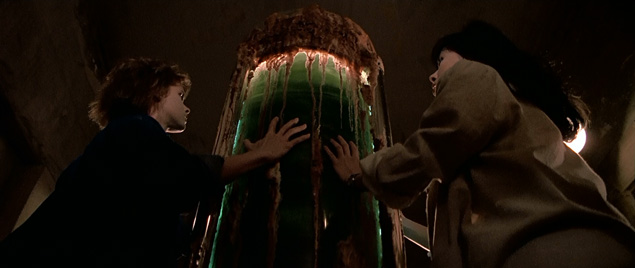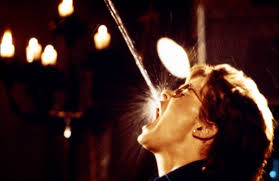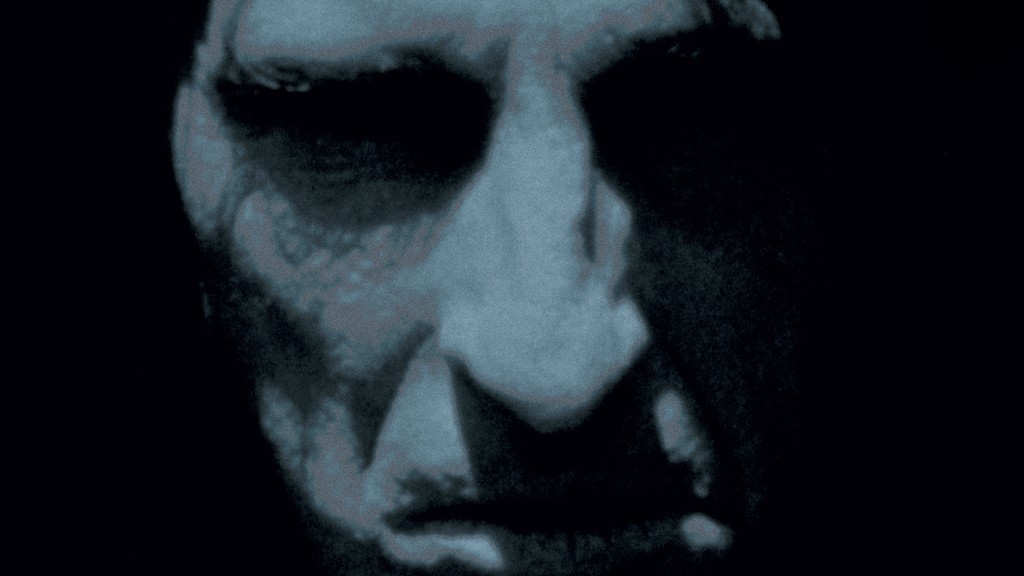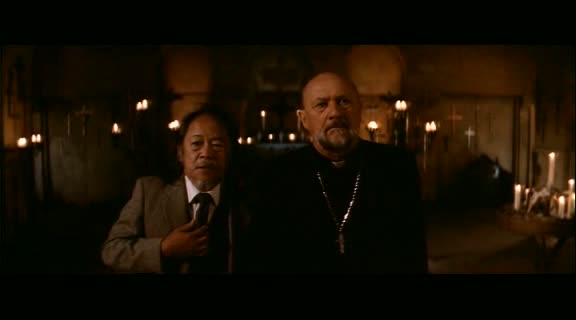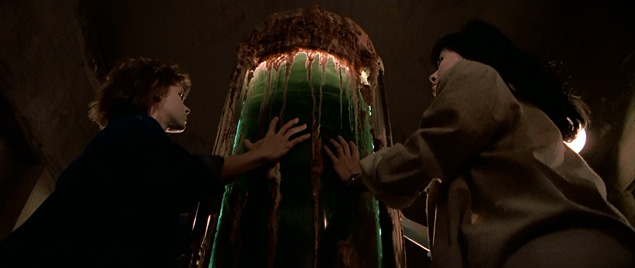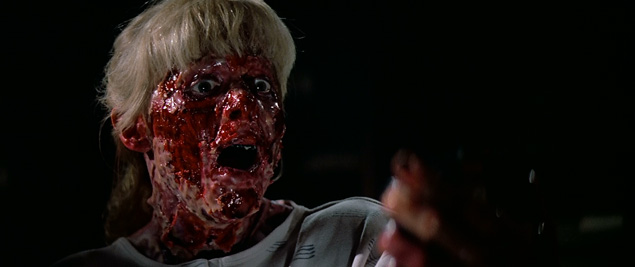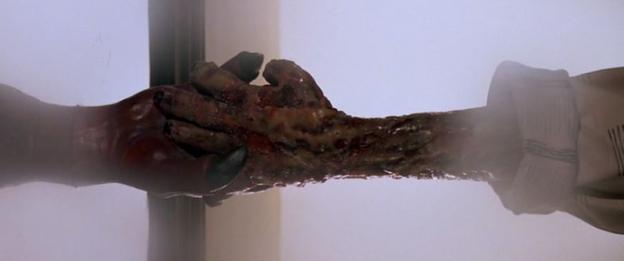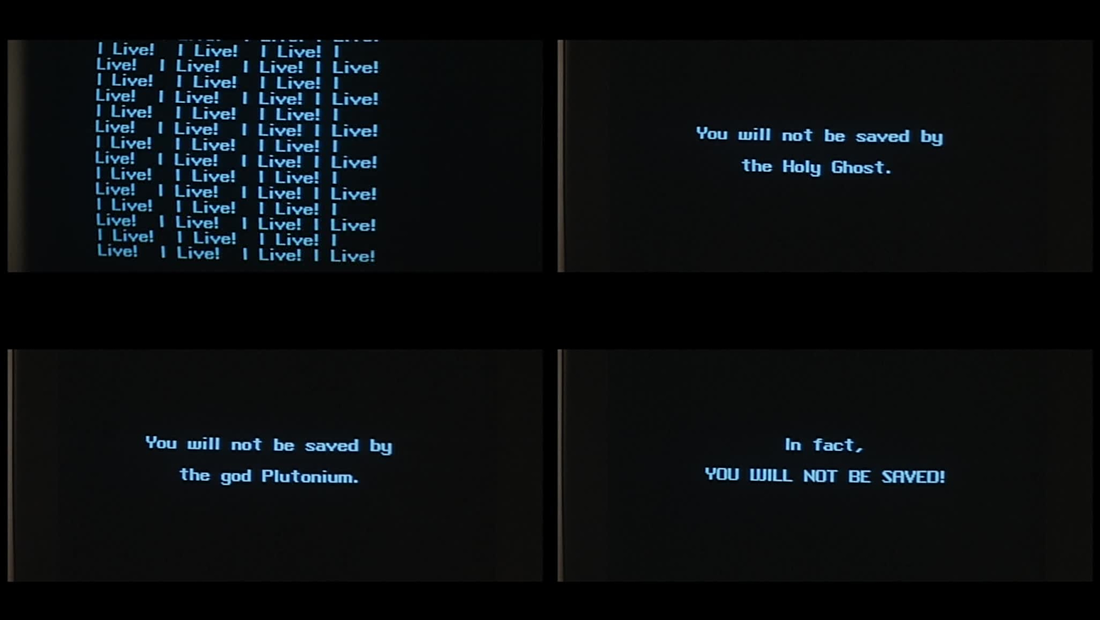
The Bad Movie Apologist
| Prince of Darkness Horror films impart vital knowledge; silver bullets for werewolves, garlic is good against vampires, always listen to the wise old man and never EVER go into the basement. No one listens though, and in this case the true evil also spouts algebraic equations. Now that’s just plain nasty! Yes ladies and gentlemen, welcome as the spawn of Satan does a passable impression of Mountain Dew and Alice Cooper fails his cycling proficiency test in John Carpenter’s Prince of Darkness from 1987. |
I am getting ahead of myself though - the plot. A full moon shines through a window, lighting the last moments of an old man’s life, possibly the only peaceful death in the whole film. A mysterious and ominous box lies on his chest. So far, so spooky and then we get the film title, adding to the expectations of your standard horror film.
However, we are then divert to a university campus, bright and carefree, where a muscular jock eyes up his potential lust/love object. There is a small disconnect given that the pair - Brian (Jameson Parker) and Catherine (Lisa Blount) - look close to a decade older than you would expect these students to be. Before we even get a chance to think, we are back to the old dead man and a nun walks in. No this is not the start of a dirty joke, but still the start of the film. Cut to the next morning and the nun is explaining how she found the dead man to a priest, credited as just ‘Priest’, played by irrepressible Donald Pleasance. Some sources cite the character as Father Loomis, but I must have missed this in the introduction. However, this would make a nice reference to Pleasance’s other notable role for John Carpenter in Halloween. So, for this review, I think I will use the Fater Loomis reference.
This is followed by Birack squinting at the sun as if something is wrong. Hand on heart, in all of these shots of insects and sunlight, it is not clear what the ‘problem’ is. The sun is looking a little clouded over and the insects pop up in odd places in the film, but neither is specifically ominous. It is more the unknown nature, the question of what is going on here that creates the atmosphere of suspense. This film purposefully does not give you all the answers; some things have to be taken on faith.
From here, we return to Loomis, who meets other priests, talks wordlessly before showing them the contents of the box - an old key. Now this is a little bit more plot detail than I usually do in these reviews, but that is the point. This is all explained in the first four minutes of the film. Plus, except for a few lines of dialogue, the whole story is told visually. For the most part, the scenes are well lit, sunny, non threatening, but the actions of the characters, the focus of the shot, and most of all the audio cues, all provide the tension and unsettles the watcher. It is a love letter to the classic silent horror films of the past. It also underlines that this film, despite lots of ‘exposition’ will never flat out explain anything - it is purposefully ambiguous.
This is still during the credit sequence by the way.
The film then has a little more of Loomis finding out the secrets of the dead man, more classes, and more of Brian slowly romancing Catherine before Birack and Loomis meet, the Priest asking the Professor for help. By the time the credits end ten minutes in, we already have enough plot, told economically and nearly all visually, to fill the first hour of a mini-series.
I did warn you I would gush over this.
With the groundwork done, Birack assembles his students at a rundown mid-city church. The location is creepy, decayed, but not classically ominous. This is no gothic edifice, but a plain blocky building in the middle of the city, albeit the sleazy side of it. As the team piles in, from out of an unassuming alley staggers a homeless man. However, this is no normal homeless man. The pale, thin man is none other than Alice Cooper, the golf-mad dark prince of rock.
While Cooper and his growing gang of homeless gather outside, the students unpack and we get character development for them all as they introduce themselves to each other, explaining their areas of expertise. Each is uncertain as to why they have been gathered, and most have a sense of hope and fun about them. The dialogue is light and almost comedic at times.
It doesn’t last though as most of the gang are taken by Loomis and Birack into the basement to see the corroded canister containing glowing, swirling green liquid and an ancient book. The basement is lit by candles, in contrast to the well lit,virtually modern interiors in the rest of the building. At nearly every step, we have things in subtle conflict or opposites are placed next to each other.
The team slowly gets to studying the canister of ‘Evil Dew’ and the book, They wisely do not open the canister - score one for common sense. However, translation of the book is disturbing enough, with both apocalyptic biblical passages and mathematical equations. In some ways, the maths is more disturbing that the bible text as once again it is something out of place and a stark contrast to the more standard horror fare.
As the book is being translated we get snippets in the tests of the extreme age of the canister, that the ooze inside it is changing. We soon have our first death as well. One of the computer technicians heads home but is soon confronted by the homeless gang. Alice Cooper runs him through with a bike frame. While the death is brutal, it is quick and without a large degree of ceremony. It is also relatively quiet and we soon switch back to the rest of the group and their tests.
Finally, we get the full translation and like most of this film, it goes beyond expectations. The hints of angels and demons are proven to be only partly right, as it emerges that millions of years ago, a great extraterrestrial creature buried his spawn on earth before being banished...somewhere...with a plan that his son would free him at some point in the future. Some time later, Jesus - who is also of extraterrestrial origins - comes to Earth to warn humanity of the danger of the canister. Fact and fiction get mixed up and confused and only a few in the church know the full truth.
While the basis of Christianity is being torn apart upstairs, in the basement, the Evil Dew is escaping. One hapless brunette student gets sprayed in the face by a spout of liquid and clearly becomes possessed. Soon after she snaps the neck of another student who had come looking for her. The rest of the gang are so far none the wiser, but the situation soon escalates. Another technician leaves and is also attacked and killed out of sight to the rest. In this case, the death is more flamboyant, not excessive, but still brutal. Next, the brunette infects the translator, and the pair pass on the possession to a third student. Each act of possession has a subtle - or not so subtle - allure to it, particularly as it is passed on mouth-to-mouth.
I could draw sexual connotations to the jet which sprays the first woman, but I am a gentleman
Soon after, the electricity is interrupted and the homeless gang barricade the doors, trapping the students inside.With every possession and unnatural act, the pace of film picks up. One of the students, Walter (Dennis Dunn), walks into a dark room with a torch and the shot almost goes POV as his light finds the canister is now upstairs, the liquid pouring out onto the ceiling defying gravity. Following the light, we then see it flooding into the body of another to the students. Unlike the jets of Evil Dew that enter the possessed, this is nearly all of the liquid.
This is when THAT scene begins. Walter is startled by the possessed, and hides in a cupboard. Other possessed move on the rest of the gang and Loomis runs into an empty room alone. This leaves Birack, Brian, Catharine and another student running to hide in another room. Each group is trapped, the possessed making no move to try and break in at this point. Birack and his group are in the next room to Walter, who yells through the wall what is happening in his. The woman who took in all of the liquid lies still, appearing pregnant. The liquid then seems to be absorbed into her and she slowly becomes disfigured, almost burnt looking.
In this whole process, each group waits, despairing, pacing the room, while the possessed stand motionless. The night gives way to day and then back to dusk. On screen this takes around ten minutes and nothing happens. NOTHING happens. But the very act of nothing happening, with the knowledge of the protagonists being trapped as an unknown entity lies near to them becoming something...unknown That sense of powerlessness permeates the scene, as we await the seemingly inevitable doom ahead. THIS is how you present tension in film.
As is becoming increasingly common in this film though, we go from one extreme to another. From nothingness we have a whole lot of...something. The entity now rises from her bed and begins to telekinetically move objects around the room. This starts to freak out Walter, who starts to tear into the wall to the next room while the entity sends two possessed to break into the cupboard to get him. Meanwhile, the other team try and disable the other possessed, being only partly successful, as they attempt to escape.
While this is happening, we start the true endgame of this film. The entity finds a hand mirror, which she turns into a liquid surface that she puts her fingers into. She becomes angry and frustrated with it being too small. Luckily, there is a full wall mirror in the room Loomis is hiding in. The entity activates this and it looks like she is seeking to bring her father back from banishment through the mirror. Loomis fights his fear and broken faith and attacks the entity, cutting of a limb and head, but one grows back and the head simply reattaches before she flings him away, trapping him behind a structure.
While Brian starts losing his fight with a possessed, Catherine runs towards him to save him. However, this brings her close to the room with the entity and she sees what is happening. The acting in this part is heart breaking. The anguish on Catherine's face is palpable. It feels very real. As a red demonic hand is pulled out of the mirror's surface, Cathrine runs in and throws herself on the entity through the mirror, just as Loomis from his prone position throws an axe and breaks the mirror. All the possessed just stop, fall down dead, with the remaining liquid evaporating into smoke exiting their mouths.
Birack consoles Brian that Catherine did the right thing and saved them all but he looks unconvinced. We then hard cut back to the video footage from the dreams. This time however, instead of a shadowy figure at the door, it is Cathrine. Jump back to Brian in bed waking from this nightmare who rolls over to...
BOOM! GOT YOU - a demonic looking Catharine and then …
BOOM! It was another nightmare. A wary Brian gets up, goes to the mirror and starts to reach for the surface
Roll credits
Oh lord - this is going to be hard - to keep it brief that is. Keeping to the highlights as you can gather from the plot overview, there are some real points I did like.
First off, we have the theme - the overlap of science and religion. I really love it when there is this overlap and here it is front and center as a defining part of the plot. Moreover, it does not say which is superior, rather that science can explain some of the mysteries of religion, but there remains much we have to take on faith to accept what happens in the film. It is no accident that some of these ideas are also used by Nigel Kneale, the creator of Quatermass. The film is credited to Martin Quatermass, the pen name that Carpenter uses for this film. There are also other nods through the film. The idea that sometimes science can go too far is also a theme shared by this film and Kneale’s work. In this case though it is more that science can only explain so much. In trying to label and codify something so unknowable, science may be putting itself at a disadvantage where faith could be superior. I know - I could be reading too much into this, but that’s how I see it. Of all the Kneale story’s that I feel Prince of Darkness most closely overlaps is The Stone Tape. I urge readers to seek this out While a little dated in its production, the idea of haunting being investigated as a recording medium is fascinating. The point in the film that the scientists all set up their equipment and start interacting most reminds me of this.
The acting also needs to be highlighted. Wong and Pleasance are great foils. It is interesting to see Wong play the philosophical but scientifically grounded role after his role as a magician in Big Trouble in Little China. Meanwhile, Pleasance wears his tortured, faith-questioning emotional journey in every line and shake of his body. Oddly, the two main male/female leads feel a little flat. They do not do a bad job, and the look of pain on Catherine's face at the end when she makes her choice is exquisite. However, where their roles come out is in an ensemble. The scientists play off each other in a naturalistic and very endearing way. Each one is our gateway character to this plot. We see the horror unfold with them, and we share their confusion. Stand outs are David Dunn who, while partly playing a comic role, provides the most understandable and real reactions to the insanity around him. Meanwhile, Jessie Lawrence Ferguson as Calder, does a great turn as a likable, jovial man mountain to the tortured possessed creature at the end. It is clear that the mind of Calder is still in there, trying to fight the possession throughout. Even Alice Cooper does a great turn. While one could argue who was playing his stage character a little, sans the makeup and with no speaking role, I feel this is something else and something a lot more sinister and powerful.
The music - as always in a John Carpenter film - stands out. The man creates his own soundtrack and while his signature synth is here, it is tempered with almost choral sounds. It is almost like Hellraiser went a little 80’s New Wave. It captures again the theme of opposites in the film, but also the undertone that the opposites can work together and may not be as different as you think.
The film is by no means perfect. It has it faults. While most can be excused for being indicative of the age of the film and its budget, they still stand out. In this respect, the effects really do pull you out of the film at times.
It’s time for that big red elephant in the room. The demonic hand of satan erupts from the mirror and really feels out of place. Thing’s are not helped by the fact that using a mirror as the door to hell just feels a little lazy after all the weirdness and work done on the film's internal mythology to this point. A throwaway line from Birack about anti-God being the mirror image of God, living on the other side of the ‘mirror’ is taken as gospel rather than a metaphor and the film suffers for it.
The film’s pacing also has some problems. Carpenter’s direction is almost flawless for 3/4s of the film. From the opening, through the slow burn of character development and into the first acts of the possessed, the tension and the fear is maintained. However, after that ten minute segment of pure tension, it starts to deflate. This may be a feeling of anticlimax after what has gone before, but it does feel that once the entity get moving, we do slip into a standard zombie/demon film. It is not a bad example of one, but after the ideas and themes of before, it feels a little flat.
SCORE - 5 cans of Evil Dew out of 5 - Despite the flaws, the positives more than make up for the negatives and this is one horror gem which may have gone under some people’s radar.
| Paul "Logan Blaze" "Sugar Bear" Anderson has mined the best and worst of geekery for many years. He hosted Shut Up and Watch This, has worked for the Nerdsphere Network, and been a regular on The Underbase podcasts and owns more truly strange movies than you or I could ever do. He is also the single greatest man bear pimp to have walked the planet. |

